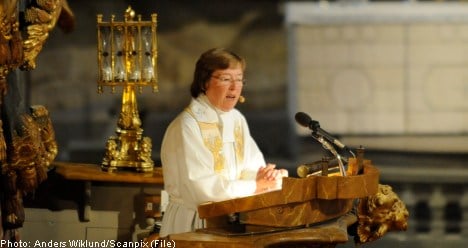The Local: Why should someone vote for your party?
Stefan Kudryk: The Left Party wants to create a Sweden where we take responsibility for each other and our environment, while enhancing the freedom of each individual.
TL: What is this election about? What is the key question facing Swedish voters?
SK: The key question is whether we want even more tax cuts for the wealthy and continued dismantling of the welfare state, or more jobs, more gender equality, better health care, schools, infrastructure and investments in green technology.
What is your party going to do about this issue?
SK: The prosperity and extensive welfare state that we are enjoying today is built upon the investments made during an earlier age. Now is the time to invest in the industries, the public services and the infrastructure of the future if we want to develop our society and meet the threat of climate change.
We want to hire more teachers and provide better adult education. We want to expand the public sector because we see immense needs for better health care and elderly care. We want women and men to equally share their parental leave because this is a crucial step toward achieving gender equality. We want to invest in green transportation like rail systems and an expanded public transportation system because this helps us halt climate change and it creates jobs. Finally, we want to overturn controversial laws like the “FRA” law, which allows mass surveillance of ordinary Swedes by the state, because we believe that privacy and personal integrity is a crucial part of our society.
TL: What does your party see as the key to helping non-Swedes successfully establish themselves in Sweden?
SK: We need to create more jobs. Our proposal to invest in infrastructure and green technologies will generate a large number of new jobs. We must also help small businesses establish themselves, and the Left Party has many solutions as to how that could be done.
However, job creation is not enough to ensure a positive integration. Many non-Swedes experience massive discrimination today on the labour market. That needs to be addressed. We must also allow for a better validation of foreign degrees and schooling.
Crucial for integration is also adequate housing and access to social insurances. We want to break housing segregation by building more affordable rental apartments in general and in affluent areas in particular.
TL: What do you say to foreign students who come here to study, but find it hard to find a job?
SK: If you have a work permit and are allowed to work in Sweden, you will naturally reap the benefits of the Left Party’s job creation package and anti-discrimination policies mentioned above. The Left Party does not advocate any special legislation allowing foreign students to automatically gain access to the Swedish labour market.
Our job creation policies apply equally across the board, regardless of whether you are a foreign student applying for a job after graduation. Our integration and anti-discrimination policies are also vital and apply for intra- and extra-EU students/immigrants.
TL: What is your party’s top foreign policy issue?
Right now, it has to be the current deployment of Swedish troops in Afghanistan. The Left Party is the only party in the Riksdag that wants to bring home the Swedish troops immediately. In our view, the war in Afghanistan is a war that cannot be won. In fact, the war is making peace impossible: with mounting numbers of civilian casualties, and an ever-increasing war weariness, the Taliban are actually gaining support among the Afghan people. The Swedish troops have been increasingly linked with the military strategies of this vaguely defined “War on Terror,” which has put them in grave danger and also distanced them from their original peacekeeping mission.
The Left Party wants to increase Sweden’s presence in Afghanistan, but we want to do it through foreign aid and a much more extensive civilian mission. The Afghans want schools, hospitals and access to clean water, not more war and violence.
To return to the election guide main page, click here.


 Please whitelist us to continue reading.
Please whitelist us to continue reading.
Member comments